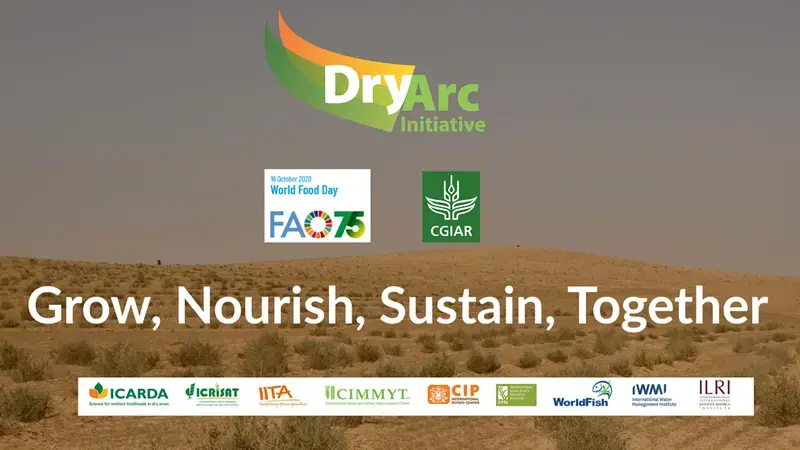DryArc – Time to Grow, Nourish, Sustain, Together.

World Food Day is an opportunity to reflect on how we can join forces to support vulnerable communities who struggle to put food on their table every day. DryArc, a CGIAR initiative targeting water-scarce regions, embraces the new ways of thinking, digitization of research-for-development, and innovative participatory approaches that are urgently needed.
The world faces a daunting combination of challenges exacerbated by COVID-19 and threatening rural livelihoods and the viability of food systems globally. This is nowhere more evident than in the drylands where due to intensifying climate change, vulnerable communities are increasingly exposed to the risk of livelihood shocks and losses, further exacerbated by the current COVID-19 crisis.
Water scarcity, land degradation, population growth, external market fluctuations, and migration flows are already major threats to food security and the resilience of the agricultural food (agri-food) systems these regions. If not addressed, this situation is likely to aggravate existing gender and social inequalities, malnutrition, nutrition security challenges, conflicts, and migration.
Joining Forces
Several CGIAR centers are collaborating on DryArc, an initiative that targets the drylands of Africa and Asia. Together, we pool our expertise alongside national agricultural research systems and advanced global research institutes, each well-versed with sustainable water management and other key challenges facing dryland agri-food systems. DryArc also welcomes a wide diversity of partners and stakeholders from development agencies, government, private sector, research institutions, and the dryland rural communities themselves.
By combining these forces, the initiative focuses on systemic change from ground up, contributing to strategic actions under global frameworks. It also fosters knowledge sharing for improved, evidence-based decision-making, builds capacities of dryland communities and promotes international collaboration in order to scale sustainable agriculture across dry regions and beyond.
Market-led innovations
The DryArc initiative will drive market-led innovations for sustainable agricultural intensification and diversification of the drylands, contributing to sustained ecosystem services, reduced water scarcity, and adaptation to climate change, making agri-food systems more sustainable and nutritious. It also aims to improve the employment and incomes of the rural poor, youth, and women in particular. In addition, DryArc will increase countries' capacity to meet the growing food and nutrition demand from expanding urban areas, ultimately contributing to more resilient livelihoods while reducing conflicts, instability, and migration.
The initiative stands out from more conventional sector or component-based programs by focusing on broader systemic change integrating different solutions in a co-design process adapted to each region and rural communities. In doing so, DryArc will more efficiently address the 2030 Agenda for Sustainable Development in a holistic manner, supporting national development strategies and targets to minimize trade-offs and maximize synergies between planned and existing interventions.
A diverse and holistic approach
DryArc comprises a wide range of crop-livestock-tree-fish systems and countries that encompass the Middle East and North Africa (MENA) region, Sub-Saharan Africa (particularly the Sahel), Central Asia, north-western South Asia, and western China. This diversity represents both a critical factor for the DryArc region's sustainability and an opportunity to share knowledge and enable socio-technical innovation across the unique networks that the CGIAR develops and maintains.
It's time to combine our efforts, strengths, and knowledge to grow, nourish, and sustain together to help meet the demands of the growing populations amid this crisis. Our actions are our future.
WATCH ICARDA DG MR. ALY ABOUSABAA PRESENT DRYARC AT THE RECENT STS FORUM
--------------------------------
DryARC is a participatory initiative of eight CGIAR centers alongside their national and international partners:


